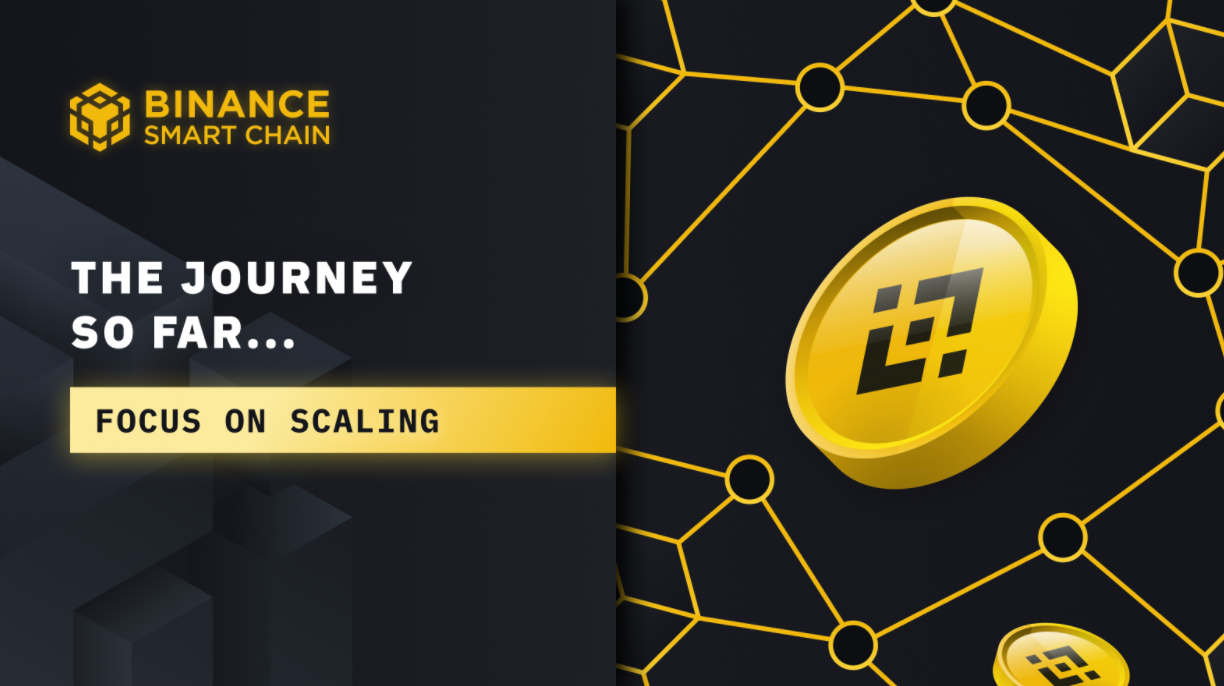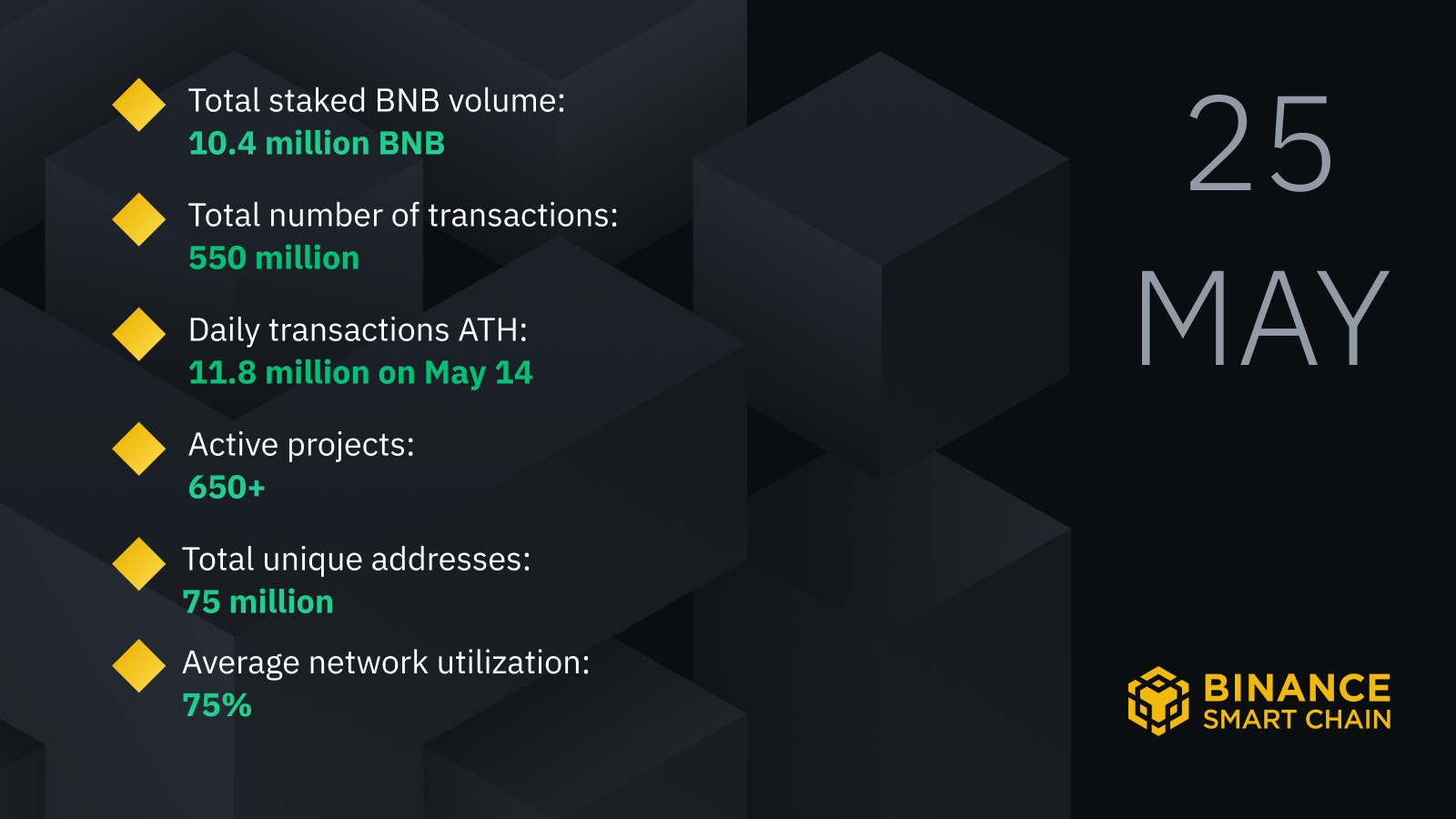Chains
BNB Beacon Chain
BNB ecosystem’s staking & governance layer
Staking
Earn rewards by securing the network
Build
Explore
Accelerate
Connect
Careers🔥
Explore Opportunities on BNB Chain
The Journey so Far: Focus On Scaling

More than 2 months passed since we published A Journey to Decentralization: Validators & Delegators article focused on explaining the principles of decentralization on BSC, the importance of validators and delegators, and a few other things. We recommend reading the article before you dive into this one, as it will give you a better understanding of the topics we’ll discuss in the next paragraphs.
The journey so far…
The launch of the Binance Smart Chain (BSC) mainnet brought something new to the cryptocurrency ecosystem – an open-source and decentralized blockchain that can handle high traffic while keeping the fees low and transaction speed high. BSC with its Proof-of-Staked Authority (PoSA) algorithm provides an ecological and scalable blockchain for everyone and aims to become the most inclusive blockchain, providing billions of people with access to a financial system.

In less than 9 months since the launch of its mainnet, BSC broke multiple records that exceeded everyone’s expectations. It attracted thousands of developers who started building decentralized apps (dApps) with unique features and attractive services and the market response didn’t take too long. During the peak bull market earlier in May, the TVL of all decentralized finance (DeFi) projects on BSC reached a staggering $45 billion USD with an average of 8 million daily transactions.
BSC took Non-Fungible Tokens (NFT) and DeFi by the storm and attracted hundreds of projects and millions of supporters and fans. Probably no one expected BSC to become one of the top blockchains in the cryptocurrency market in such a short time.
Top 10 projects based per TVL. Source: BscProject.org
The current network capacity
However, with the significant growth comes significant strain on the network, and the BSC network tested the performance and capacity of its validators multiple times during these busy months. The recent volatile market movements impacted not only the prices of different crypto assets but also the networks processing all the transactions. As one of the largest blockchains, BSC also tested its capacity during the market panic, processing more than 220 transactions per second during peak times.
Nonetheless, the average BSC block time remained stable (3.04s) even during the periods with the highest congestion, and only a slight percentage of validators missed blocks. The validators showed strong support and improved their stability and reduced the validator miss block count to hold the network during the most challenging times. As you can see from the chart below, the number of missed blocks significantly reduced after the rollout of the latest full node update (discussed below).
Validator block miss events. Source: Tenderly.com
The recent network congestion also highlighted the downside of a decentralized blockchain, where there’s no single point of failure that someone could fix to improve the performance. With community-owned validators, each validator bears the responsibility to upgrade their computing capacity and hardware, which often comes with a significant cost. Due to the lack of a centralized entity that could simply spend more money to boost the network, the work has to be carried out by a decentralized set of participants (validators and delegators).
Steps to avoid future congestion
The BSC community was fast to respond to the congestion, and the developers behind the BSC network ramped up collaboration with partners and service providers to ensure that there is no delay in RPC queries.
- QuikNode : https://quiknode.io
- ANKR: https://app.ankr.com/api
- GetBlock.io: https://getblock.io/nodes/bsc
In addition to different partnerships aiming to bolster the performance, the BSC dev community released BSC v1.1.0 for all full node operators on May 10. This new version improved the internal logic on transaction execution, storage, and P2P communication. The latest update adds the option of full and fast sync, decreases storage usage by up to 50%, and includes a few less significant tweaks and fixes. Soon after this release, the validator community coordinated the upgrade process and updated their nodes to the latest version.
Increasing the gas limit to scale BSC
Thanks to the BEP91 community proposal, the gas ceiling of BSC has already increased to 60MM. However, the BSC network almost reached the 60M gas limit during the peak time according to the following screenshot, proving that this gas ceiling increase might not be large enough to handle the increasing demand for BSC projects.
Binance Smart Chain Network Utilization. Source: BscScan.com
Due to this reason, the BSC community, validators, and projects revived the discussion of increasing the gas ceiling once again. The recent performance tests show that thanks to the recent development work from both Ethereum and the BSC community, the current client of BSC could handle more gas in a block than it currently does.
Considering the complex network environment on the mainnet and the different hardware of validators, we want to call upon the validator community to gradually increase the gas ceiling to at least 100MM.
We believe that this target can be achieved within several months, preparing the network for future demand. With more input from the talented community developers surrounding BSC and ETH, more improvements are being made to the internal logic on transaction execution, storage, and network communication.
Your support matters!
Every coin has two sides, and there’s a positive side to network congestion as well. It shows that the Binance Smart Chain ecosystem attracts many cryptocurrency users and newcomers joining the world of crypto. BSC is quickly becoming the go-to blockchain for NFT and DeFi projects. The congestion not only showed us the issues that must be addressed, but also the massive potential of the BSC network and its ecosystem. We are confident that the public interest in BSC will continue to grow and that we’re just at the beginning of something grandiose.
None of this would be possible without the support from BSC validators and delegators who carry the burden of maintaining the network. We also want to thank our amazing community who supports us, interacts with BSC projects, and spreads the word about BSC. Your support is highly appreciated and we heartily value your loyalty during these challenging times.
Join us on BSC’s journey to decentralization!
- Click here to become a validator.
- Click here to become a delegator.
- Click here to start building on BSC.
Social media and channels
Twitter | Discord | Forum | Blog | Dev Telegram
Resources
.